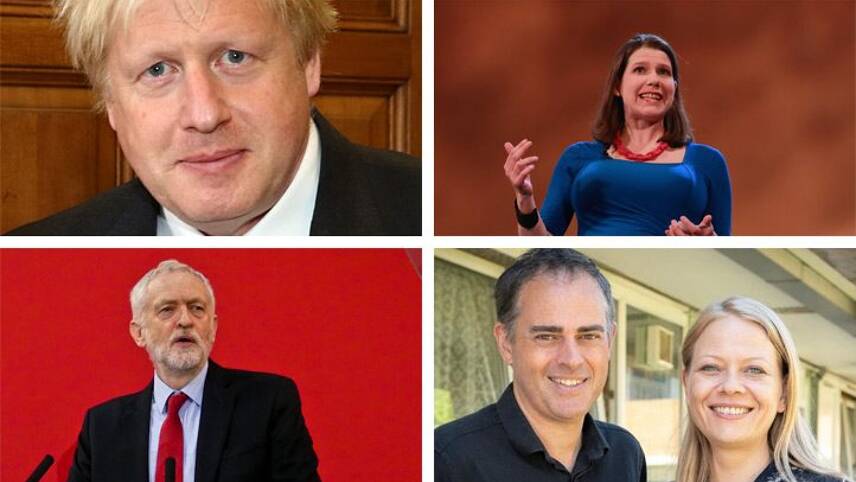Register for free and continue reading
Join our growing army of changemakers and get unlimited access to our premium content

Here
Flooding across swathes of England this week have forced thousands of people to leave their homes, with many areas in the east Midlands, Yorkshire and Derbyshire experiencing a months’ worth of rain in a day.
This has forced all of the UK’s major political parties to outline more detail around their policies on infrastructure, environmental protection and climate change – the latter of which the Met Office has formally linked to changing rainfall patterns across Britain.
While Prime Minister Boris Johnson was bearing the brunt of much criticism of the Government’s response to the flooding, he, like many of his rivals for the 12 December general election, found time this week to announce a multi-billion-pound spending plan centred around environmental sustainability.
Here, edie rounds up Johnson’s proposals, alongside the other key green policy spending announcements you may have missed this week.
The Conservative Party
Speaking at LEVC’s plug-in hybrid electric vehicle (EV) factory in Coventry on Wednesday (13 November), Conservative Party leader Boris Johnson outlined a multi-billion-pound package of spending covering green tech, innovation and skills.
Included in the package was a commitment to spend £800m on carbon capture and storage (CCS) by the mid-2020s, to help industrial-scale clusters incorporating such technology to become established. The funding builds on Theresa May’s BEIS line-up’s plan to bring the nation’s first large-scale CCUS facility online by the mid-2020s, bolstered by new regulations for retrofitting old oil and gas facilities.
More broadly, the package contains an overarching pledge to double national R&D spending to £18bn by 2024, with nuclear fusion among the key focus areas. This was to be expected, given that the Conservative Party’s net-zero manifesto includes a controversial plan to build a £220m nuclear fusion plant by 2040.
Johnson additionally pledged this week that, if re-elected, the Conservatives would spend £500m on ensuring that every person in England and Wales lives and works within 30 miles of an EV charging point. PwC estimates that the number of EV’s on British roads underwent a compound annual growth rate of 89% between 2011 and 2018, compared to a 44% compound annual growth rate for charging points.
The last “green” part of the package is a commitment to up the amount of offshore wind capacity the UK is targeting by 2030 from 30GW to 40GW. Johnson said this move would create 9,000 additional jobs.
The Liberal Democrats
The Lib Dems kick-started a week of new pledges by promising to re-instate the Department for Energy and Climate Change (DECC), which was abolished by Theresa May in July 2016, on the party’s “first day” in office.
The party’s climate spokesperson Wera Hobhouse said the move would “undo” some of the “damage” of the Conservative Party’s environmental policies, with deputy Lib Dem leader Ed Davey adding that DECC’s closure was a “major setback for the UK’s climate change efforts”.
This pledge was then bolstered on Thursday (14 November) with a fresh commitment to spend an extra £100bn of public finance on climate mitigation and adaptation and environmental conservation and restoration over a five-year Parliament. The Lib Dems are notably targeting net-zero by 2045, five years ahead of the Conservative Government’s deadline, and say the extra funding would be secured through £85bn of borrowing and £15bn of tax changes.
Davey said in a speech on Thursday that the spending package will include a £10bn fund for domestic renewable power generation – touted to attract a further £90bn of investment from the private sector and international bodies – and a £15bn pot for the built environment. This latter pot will be used to fund an “emergency” ten-year programme aimed at decarbonising heat, reducing fuel poverty and making the UK’s building stock more energy efficient.
The Green Party
The Green Party, meanwhile, confirmed a commitment to open a £100bn-per-year climate emergency coffer as part of its overarching vision to make Britain carbon-neutral by 2030.
The majority of monies for the funding pot would be borrowed, taking the UK Government’s annual borrowing to £140bn, according to the Institute for Fiscal Studies.
Away from funding, the Green Party has also promised to appoint a “carbon chancellor” if elected. The holder of this new position would be based at 11 Downing Street and tasked with judging all economic policies and key Government decisions against their likely impacts on the environment. The move would be complemented by a renaming of HM Treasury to ‘The Department for Economic Transformation’, and the establishment of a new ‘Department for the Green New Deal’.
The Labour Party
Labour’s biggest announcement of the week has been a promise to part-nationalise BT and ensure all UK homes and businesses have free access to full-fibre broadband by 2030 – a move which, in itself, may have environmental benefits.
But it has also made new green economy commitments, pledging £56m to create a network of 2,000 new ‘solar power hubs’ at public facilities over a five-year Parliament. Most of these ‘hubs’ would be hosted at libraries, with Labour claiming each facility could save £3,000 on annual energy bills by installing onsite solar.
Under the plan, which forms part of Labour’s proposed ‘Green Industrial Revolution’, participating facilities would be able to export excess electricity generated by their onsite arrays back to the UK power grid in exchange for additional income. Jeremy Corbyn claims that participating facilities will, on average, garner £1,080 per year in this way.
Over to you…
//
Sarah George


Yet another 800m on CCS following the 1.8Bn already spent on a technology that simply wont work. Lets see the life cycle analysis and mass energy balance – inevitably this will show that the parasitic power requirement is virtually 1:1 i.e you require the power output of a power station to sequestrate the C02 of the power station. To power such a plant using renewable power is a nonsense as nothing is gained and much lost .